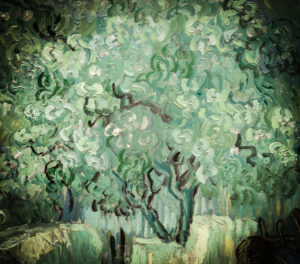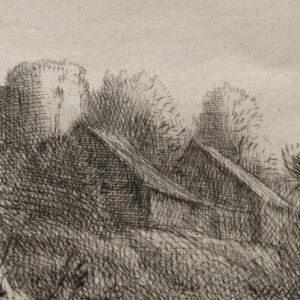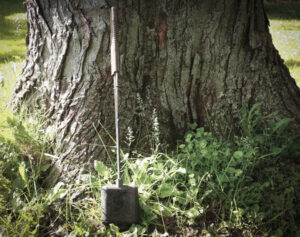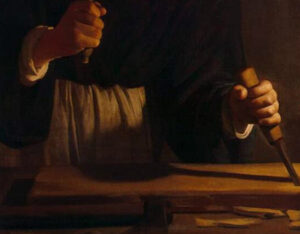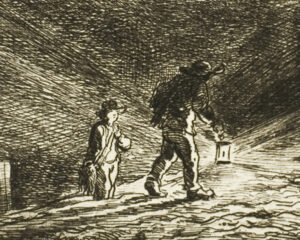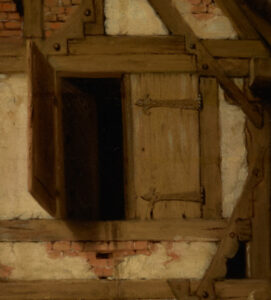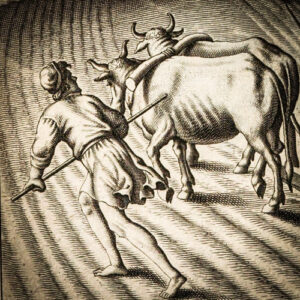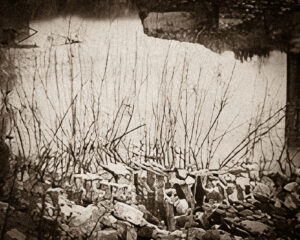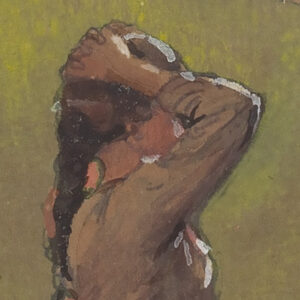—Ink and Echoes—
On the Agricultural Family, the Industrial Family, and the Right of Primogeniture

Louis de Bonald
1826
Translated by Dr. Christopher Blum
—This translation originally appeared in Critics of the Enlightenment—
When we see our liberal philosophers so exclusively preoccupied with commerce, industry, the progress of manufacturing, and the discoveries of the mechanical arts, we are led to admire the mutable nature of philosophical opinion. Thus Rousseau admires nature, and that only in its wild state. He would willingly take us back to eating our meat raw, wearing the skins of beasts, and sleeping in the shelter of trees or in a lair. In society he saw naught but servitude, weakness, crime, and misery. His complaints against it were all drawn from wild nature: the savage’s independence from men and human needs, his natural goodness, his bodily rigor.
But our hard Spartans have become effeminate Sybarites. The other philosophers speak only of the arts and industries that multiply our needs and pleasures, and they should like to see us all floating through life in palaces of gold and silk. Of frugality, temperance, and moderation of desires they no longer speak. For man in society, life is reduced to producing for consumption and consuming to produce. To them, society is divided into two classes: producers and consumers. The philosophers of recent centuries also bitterly and arrogantly denounce conquerors and their wars of conquest. Yet when they found these conquests profitable to their doctrines, they sounded trumpets to honor the conqueror, and in their philanthropy, benevolence, and humanity, they pardoned him for these appalling wars, whose success was secured by a profound disregard for a mankind pitilessly sacrificed to the extravagant dreams of ambition.
Today, these philosophers demand the independence of industry, the most dependent of all professions. They see commerce as the bond of peoples and the guarantee of peace in the world, even though the jealousies of commerce have been the subject of all our wars for some time, as they shall be for all those waged in the future. To commerce they attribute the spirit of liberty that has spread over Europe, although all the merchants, even the wealthiest of them, daily or even hourly shackle their personal liberty by pledging themselves as security for loans both large and small.
Today, some would confuse industry and agriculture and even place them in the same rank in society. Let us, however, distinguish them in their character and effects, and by their varying influences upon the mind and habits of men and the constitutions of states. This question is not foreign to the measure on primogeniture that has been submitted to the chambers, inasmuch as those who would establish or permit it for the land-owning family have never intended to extend it to the industrial family.
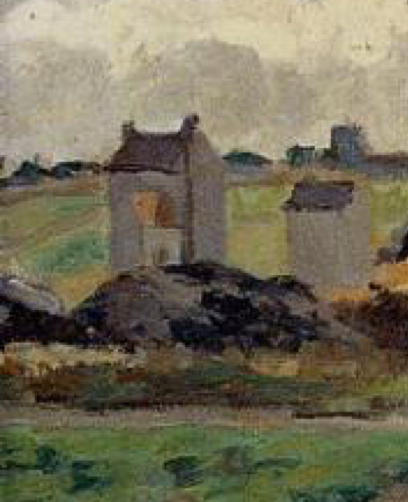 Agriculture feeds her children, but industry gives birth to children she cannot always feed. The child who comes into the world in an agricultural family finds his sustenance already assured, for the earth that his parents cultivate and that he will cultivate in his turn awaits him to give him his bread. The child born into an industrial family expects his sustenance from the salary he will earn if a master employs him, and if his industry is not stricken by events that could make it falter, or shut down, or prevent the sale of its products. The farmer lives from his produce even when he does not sell it. The industrial worker cannot live unless he sells what he produces. Thus, the agricultural family enjoys an existence independent of men and events, while the industrial family is dependent upon them both.
Agriculture feeds her children, but industry gives birth to children she cannot always feed. The child who comes into the world in an agricultural family finds his sustenance already assured, for the earth that his parents cultivate and that he will cultivate in his turn awaits him to give him his bread. The child born into an industrial family expects his sustenance from the salary he will earn if a master employs him, and if his industry is not stricken by events that could make it falter, or shut down, or prevent the sale of its products. The farmer lives from his produce even when he does not sell it. The industrial worker cannot live unless he sells what he produces. Thus, the agricultural family enjoys an existence independent of men and events, while the industrial family is dependent upon them both.
A farm is indeed a family whose head is the father. Whether he owns or rents the farm, he busies himself with the same labors as his servants and eats the same bread, often at the same table. The farm nourishes all its offspring. It has occupations for those of all ages and both sexes. Even the elderly, who cannot perform heavy labor, finish their careers as they began it and stay around the house watching the children and animals.
There is nothing like this in the industrial family, whose members work in isolation and often in different industries, and who do not know their master apart from the exigencies of his commands. Industry does not nourish all ages and both sexes. It does employ the child, and often so young that his health and strength are ruined. The child may receive some instruction, but he is abandoned in his advanced years when he can no longer work. Then the industrial worker has no bread except what he takes from his children’s salary or what he receives from public charity.
The farmer toils from the rising to the setting of the sun but never at night. He rests on Sunday and takes up his work again on Monday. The industrial worker works even at night in order to gain a higher salary, especially when he works at home by the piece. Whether he rests on Sunday or not, overheated by his forced labor, on Monday he debauches.
The farmer works outside and standing up. He strengthens his body by the hard and painful labor of the fields and exerts his intelligence upon the numerous details and variations in the culture of the earth, trees, and beasts. He tames the animals and forces rebellious nature to submit to his care. The industrial worker works hunched over and sedentary, turns a crank, makes the shuttle go to and fro, and pulls together the threads. He spends his life in cellars or attics and, becoming a machine himself, he exerts his fingers, but never his mind. Everything improves the intelligence of the farmer and lifts his thoughts towards him who gives fruitfulness to the earth, dispenses the seasons, and makes the fruit ripen. Everything debases the intelligence of the worker. He sees nothing above the master who employs him, or at best the inventor of the machine to which he is attached. We can thus say that the former waits for everything from God, and that the latter receives everything from man.
The farmer tells his neighbors of his discoveries and the new processes that he invents to improve his cultivation. The industrialist and the merchant keep their speculations secret. We can thus say that the agriculture that disperses men about the countryside unites them without bringing them together, while the commerce that crowds them into cities brings them together without uniting them.
The agricultural population is strong and vigorous, the industrial population frail and sickly. Not long ago a judge in a small canton in Switzerland bitterly deplored the degeneration of the beautiful people of his country since workshops and factories had been established in it.
Nor am I afraid to advance that there are nowhere more beggars than in manufacturing cities and industrial countries. England is the proof of this, for in spite of its immense fortune and widely extended industry, a large part of its inhabitants falls under the charge of the landholders. Their poor-laws are an oppressive tax. What does it matter that their poor are better clothed and better nourished than ours, if they are clothed and nourished only by public charity and parish offices?
If we are not careful, these poor laws will come to France under other forms and will spread and worsen in proportion to the progress of industry. Is this not a tax on the poor? The upkeep of the ever-increasing number of foundlings and orphans, detainees and convicts is paid by taxes and consequently by individuals. Those who study statistics could be easily convinced that these public poor, these poor of the state, some of whom require to be fed and all of whom need to be supported, kept, and watched, come in greater numbers from the workshops of industry than from the farms.
I do not speak of that local industry, or, if you will, the national industry, which is the companion of agriculture and puts the produce of the soil to work for the needs of those who cultivate it. This exists always and everywhere, for men have always built houses, spun flax and wool, forged arms and tools, and exercised all the arts necessary to human existence. I speak of that cosmopolitan industry that would furnish the entire world with products the primary materials of which it has scoured from the four corners of the earth. This frenetic industry causes our political leaders to consider foreign nations not as friends or allies, but only as customers.
Local industry serves agriculture, which demands its products by furnishing it the material and paying for them in the same fashion. The larger industry serves the whole earth, and the nation that produces the most for the foreigner is the one that most serves the nations who consume these products, and, consequently, it is the most dependent upon their needs or caprices.
Yet almost every country has the primary materials for those industries and arts necessary for human existence, and the taste for these arts is widespread, the workers easy to move, and a machine spins or makes its products just as well in Russia as it does in France or England. Therefore, it does not seem to be a wise or farsighted policy to depend overmuch upon foreign consumption for the prosperity of our country.
Necessities can be found and made everywhere, but superfluities can be kept out by governments.
Thus, by a singular contradiction, while all governments favor the progress of industries that provide for other states and try to extend their commercial relations beyond all bounds, these same states, through protective laws and armies of toll collectors, seek to limit the competition of foreign products with domestic ones. Everyone would sell and no one would buy. One may at least hope that the now-popular republican principles and sentiments will one day inspire us with the spirit of frugality, temperance, moderation, and economy, those virtues so strongly honored by the ancient republics. For they would be strange republics if they wished to begin as our monarchies ended, that is, in luxury. And another thing: in our monarchies, luxury was almost a duty of rank, whereas in our republics it will be only private and personal taste.
One may at least hope that the now-popular republican principles and sentiments will one day inspire us with the spirit of frugality, temperance, moderation, and economy, those virtues so strongly honored by the ancient republics.
It is amply proven that great profits are to be made by culling primary materials from the four corners of the earth, submitting them to labor at home, and then exporting the products to the whole world. The worker earns his keep, the captain his freight, the banker his commission, the state its entry and exit tolls, and so on. But let the state consider that large industry brings great expenses that are more political than fiscal: laziness, missed work, the sick and the aged left to the charge of public and private charity, the lack of instruction for the children of both sexes crowded into workshops, libertinism and intemperance that necessitate prisons and houses of detention and correction, the need to watch and police the armies of countrymen who flood into the manufacturing cities, and the need to prevent or punish those workshop revolts so alarmingly common in England and recently spreading to France. Then the state may discover that there is not so much profit after all in this large industry that makes the population grow boundlessly, and for which a precarious subsistence can only be procured by constantly extending the industry, and consequently further increasing the population. The agricultural population is limited by the extent and fertility of the soil it cultivates, but the industrial population is not. It produces without limit, until the failure of primary materials or the consumption of its products forces it to withdraw into itself and to close the workshops.
I return to the proposition with which I began this essay: agriculture feeds her children, but industry gives birth to children she cannot always feed.
In an agricultural region (or an entire kingdom) with only the industry required to make use of the products of the soil and the primary materials furnished by it, local industry would employ the agricultural population in excess of that needed for the cultivation of the earth. All those able to work would find work either in the fields or in industry. There would be a natural proportion between the two parts of the population occupied with one or the other set of tasks. There would be neither too much nor too little work, neither too few nor too many hands, and no one would suffer.
Yet should one suppose that large industrial establishments destined to produce for foreign lands were suddenly to arise, the population that furnished labor to the agriculture of the land and to local industry would no longer suffice. New modes of labor will demand a new population. It will form rapidly. A loom to make wool or linen cloth will be a dowry and tools a patrimony. The people will marry, build houses, and bear children. A village will become a town, a town a city. And to see such examples of rapid growth we need not leave France.
Thus, if the manufacture of cotton fabric formerly prohibited in France (when the government judged that the native materials of wool, linen, and silk sufficed to clothe us) today employs several thousand men, it is almost as if, when the time of prohibition was lifted, we had imported several thousand Indians into France. As these industries prosper, they create great private fortunes. This is what is today called the national wealth, although it is difficult to understand why we call wealthy a nation where alongside a few millionaires there are several million paupers who labor much, earn little, save nothing, live in the cabarets, and die in the hospitals. Such is the internal condition of the nations that we call rich, while in those thought to be poor because they have few large fortunes, as for example Sweden and Norway, there are, in proportion, fewer paupers than in France and in England.
Yet these large industrial establishments can come to ruin, either through the loss of primary materials, the importation of which can be thwarted by political circumstance or bad weather, or through the caprice of fashion, the tariff barriers of foreign states, the establishment elsewhere of a more advanced or successful industry of the same kind, or, finally, from the retirement or death of the industrious founder of the establishment. When this ruin comes, a flourishing city loses its population, men lose their jobs, and homes lose their inhabitants. We see many examples of this throughout Europe.
Let me not be accused of calling into question the utility, or rather the necessity, of industry. For it is to industry that we owe the use and enjoyment of all the goods that the Creator has put within man’s reach in order to support, to preserve, even to embellish his fleeting existence. Yet I warn governments of the danger an overextended industry poses to their tranquility when, in order to serve all its neighbors and even the most distant people, it gives birth to a larger population than religion can instruct or authority restrain, and sometimes even larger than industry can feed. These considerations are unnecessary in times of prosperity, when governments have nothing to do and sleep like a captain whose sails are filled with a favorable wind. They are for the reverses and the times of trial to which industry can be exposed when the hungry multitude demands tomorrow’s bread from a government whose supply ran out the day before.
Agriculture waits for everything from God and does not rebel against the author of nature if hail or frost ravages the crop. But industry, which waits for everything from man, blames everyone for its miseries: the masters, the rich, and the government. The government is forced to use stern measures to maintain public tranquility against these desperate men whose need carries them to every excess, and whose discontent is all too often heated up and set alight by malice. It is a deplorable situation when authority is forced to respond with rifle shots to the complaints of those miserable men who ask only to keep the career the government has forced upon them. In truth, a century of industrial prosperity does not make up for an hour of this terrible but necessary use of force.
This is, however, what has frequently been seen in England, and at this moment Liverpool and other manufacturing cities are soliciting loans from the government in order to feed one hundred fifty thousand unemployed and hungry workers. Here is a new danger for government: to accustom an idle population to live at the public expense.
Yet even in this respect the situation of France is more dangerous than that of England. The English remain a nomadic people, and the government can send its excess population to the colonies, foreign bureaus, mines, and enterprises that have made the whole globe a veritable tributary of England. Thus, in an astute policy, England favors the emigration of the rich, who disseminate the tastes and habits of their land without ever picking up the tastes and habits of other peoples. France does not have this resource, for she has no more colonies. And the Frenchman is more attached to his land. The government is unable to rid itself of an idle and disquieted population, and a boiling pot breaks if it cannot spill over.
Let it not be doubted that it is in hopes of one day taking this superabundant population into its pay that one party in Europe, promotes the exaggerated growth of industry and never finds enough of it, certain that it can give work to these idle arms, no matter how many, in the immense workshop of the revolutionary industry.
In this comparison of agriculture and industry, I kept until the end the final and most characteristic of their differences.
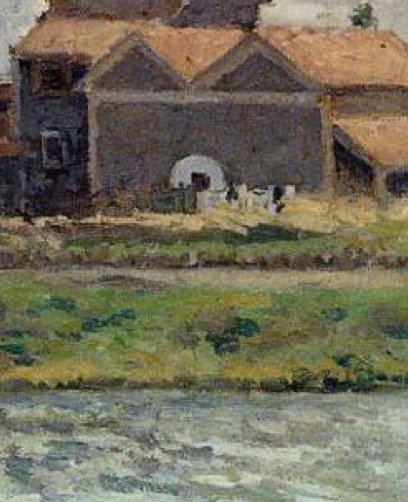 The farmer, forced to be moderate in his tastes, economizes in his purchases, and as all that he has is under the sun, cannot compromise the future of his creditors, who, by consulting the table of probabilities and by estimating the goods that they can see before their eyes, can judge with certitude to what point it is prudent to engage their funds in agricultural investments. But the industrialist and the merchant, for whom the active and the passive are equally unknown, and who today compete with the highest nobility in purchases and luxuries, only present to their creditors as a pledge of their credit bold and exaggerated speculations, whose ill success ruins the creditor and does not always ruin the debtor, who, even on the most unfortunate hypothesis, acquits himself with respect to his creditors with a balance sheet and a suicide. And who can know how many families have been ruined by the numerous failures that have of late broken out in all the commercial centers of Europe?
The farmer, forced to be moderate in his tastes, economizes in his purchases, and as all that he has is under the sun, cannot compromise the future of his creditors, who, by consulting the table of probabilities and by estimating the goods that they can see before their eyes, can judge with certitude to what point it is prudent to engage their funds in agricultural investments. But the industrialist and the merchant, for whom the active and the passive are equally unknown, and who today compete with the highest nobility in purchases and luxuries, only present to their creditors as a pledge of their credit bold and exaggerated speculations, whose ill success ruins the creditor and does not always ruin the debtor, who, even on the most unfortunate hypothesis, acquits himself with respect to his creditors with a balance sheet and a suicide. And who can know how many families have been ruined by the numerous failures that have of late broken out in all the commercial centers of Europe?
These reflections on agriculture and industry were suggested to me by an article in a journal of wide circulation that questions the practicality and utility of the measure—announced in the discourse of His Majesty at the opening of the session and since then proposed as a law—to reconstitute the landowning family and to forestall, if there is still time, the morcelization of landed property. Since then, the same journal, in the number for February 25th, has favorably reviewed a treatise On the Right of Primogeniture by the celebrated advocate Monsieur Dupin, who opposes the proposed law.
I will hazard several observations upon what I have read in the journal.
I dare say that on such a grave question we must not consult either the policies of lawyers or bankers. These two professions, by habit, interest, and duty, are exclusively occupied with private interests. But on this matter private interests and personal affections must be sacrificed to the general interest of society and to public affection.
The profound motives behind the proposed law cannot be appreciated in Paris, where a man takes his street to be a fatherland, an apartment let for three, six, or nine years to be a paternal house, and rents tallied in a ledger to be a patrimony.
Monsieur Dupin’s letter to his brothers, reported in the journal, is a masterpiece of fraternal tenderness and sensibility, and we are happy to find such touching expression in it during these wretched times when one hears only of domestic crimes, wives who poison their husbands, husbands who assassinate their wives, sons who destroy their fathers or brothers, and—a thing unknown and reserved for our day!—mothers, legitimate mothers, who destroy the children to whom they have given the light of day.
No doubt it is respectable, this sensibility of fathers and mothers, brothers and sisters who complain of the lot of their younger brothers, who are treated by the law with less favor than their elders.
Or who, at any rate, seem thus treated, for the eldest, attached to the soil by a larger share of the paternal inheritance, has the often-heavy charge of family affairs. Yet there is a more manly sentiment, that of the statesman for the lot of families without permanence and without a future, where the brothers only await the death of the father to leave their homes and begin a division that will leave them nothing in common but a ruinous legal proceeding in which their affections and, all too often, their patrimony will disappear.
It is absurd to ask whether the right of primogeniture be of divine or natural right. The law was not made for the eldest. In the eyes of God or nature, he is no greater than his cadets, even in royal families. The law exists for the preservation and permanence of the landowning family. Now the families that cultivate the earth that the Father of mankind has given them for their dwelling assuredly are of divine and natural right. So it is that the law of male heredity by primogeniture exists for the permanence of states. So it is that nature has by the same means and for the same ends established it in domestic society, just as it has in that public society of which the family is the element and type.
Let us then say that the right of primogeniture is but an abridged saying to express the first and sole means of the permanence of families, and it is true both that the right of primogeniture is not a right of the eldest and that the father may transfer the right of the firstborn to the youngest of his children.
In our age, individuals see nothing but individuals like themselves, particularly when everything in society has been individualized. The state does not and should not see man except in the family, because it only sees the family in the state. In the eyes of the state, there is no individual apart from a family.
The state does not and should not see man except in the family, because it only sees the family in the state. In the eyes of the state, there is no individual apart from a family.
Monsieur Dupin congratulates our new laws for having abolished free testaments and the right of primogeniture, the two great branches of our former legislation, because they were inexhaustible sources of long and expensive lawsuits. But I assure him that these two sources of lawsuits have been replaced, at least in agricultural lands, by a still more fertile and inexhaustible source of lawsuits: the equality of inheritance. I speak of suits for supplements to legitimate inheritance. There is a difference. Suits against testaments in general only took place in wealthy families, whereas suits for supplements to legitimate inheritance, a veritable gold mine for the lawyers and land brokers, ravage and ruin the smallest landowning families. For the cadets, who stubbornly believe that their father has given their elder secret advantages, and who no longer respect either their father’s will or their elder brother’s will overturn the house ten times and even dig up the cinders in the hearth to discover the few pennies kept out of the common inheritance.
What are we to say of the example of the Hebrews and the Romans adduced by our celebrated jurist? The monarchy of the Hebrews was not our monarchy, nor the Roman Republic our republic. “The ancients,” said Montesquieu, “did not have a tempered monarchy.” Thus, we can say that their monarchies were not as good as ours, while their democracies were perhaps better, at least they were better than the Convention, because nature wills that good institutions improve over time while bad ones become worse. Yet the Hebrews had the right of primogeniture: the law of Moses gave two shares of all the father’s wealth to the eldest. As Jacob lay dying, he called his eldest son Ruben his strength, the first of his gifts, the greatest in authority (see Gen 49:3). If a man had two wives, one beloved and the other hated, Moses did not allow the son of the cherished wife to be preferred to that of the odious wife if the latter were the eldest, and gave him two shares of all the goods, the share of the firstborn. While the Hebrews did not have the right of primogeniture as we understand it, they had something better for the preservation of family name and property, which is the only purpose of the right of primogeniture. In order to perpetuate the family name, the law commanded that the brother marry the widow of a brother who had died without issue (see Deut 25:5), and, to preserve property, it commanded that in the Jubilee year—that is, every fifty years—alienated goods return to the original families (see Lev 25:10).
These laws were effective in ways different from our own, nay, they were more able to preserve the family name and property. Monsieur Dupin thinks them harsh. Indeed, they were severe. These laws separated the Hebrews from foreigners in order to preserve them from contact with idolaters and to maintain their faith in the unity of God. Yet they were admirable for making a people of brothers, an indestructible people. They were, as Rousseau said, “proof against time, fortune, and conquerors.”
Whether or not the Romans had the right of primogeniture and the prerogative of the firstborn before Augustus, they valued the permanence of the family and the preservation of its goods. Their laws prevented the father from naming his wife or only daughter as heir for fear that she would take the goods to another family. In their lessons and tales, they spoke only of their ancestors. Their laws, customs, and manners were all based upon the ways of the fathers, whose images they preserved with great care and whose funeral rites they nobly decorated. Shall we say that this attachment to family was only seen in the patricians? Yet these were the only ones with names and properties to preserve. The people were clients of the great families and lived on the distributions of their government and the fruits of their conquests. Their tribunals only speak about the division of lands because they did not have any.
“When the Romans agree with me,” said Montesquieu, “I am confident.” Now then, these Romans, so great as a republic, so strong an aristocracy, our masters in legislation, gave immense power to the father of a family. To preserve the family property, they needed neither the Twelve Tables nor any other law, for the father’s power was already established. It was very conservative in another way, because he had absolute authority over his children, both during his life and after his death. This domestic monarchy was the corrective of political democracy during the republic’s best centuries, and when it was destroyed by the introduction of democracy into both family and state, Augustus attempted to reestablish it and instituted the right of primogeniture in families at the same time as he established monarchy in the state.
When the father had the right of life and death over his children, can it be believed that he lacked the power to regulate his succession and thereby insure the permanence of his family? We must cite the full passage from Montesquieu to oppose his authority to all those so-called natural laws about the equality of inheritance. “Natural law,” he says, “ordains that fathers feed their children, but it does not oblige him to make them his heirs. The division of wealth, laws about this division, and the procedure for inheritance can only be regulated by society, and, therefore, by political or civil laws.”
It seems to me that after the example of the Hebrews and the Romans, our elders in religion and our masters in legislation, after the constitutions of the legislators of the late Empire, Monsieur Dupin need not resort to the invasions of the barbarians in order to explain the establishment of the right of primogeniture in Europe. Yet some would see it as the result of the feudal laws, an origin which, it is held, would brand it as infamous. Yet Montesquieu was speaking of these barbarians when he said, “they established the best form of government that men could imagine.” So, if it is true that representative government was the ancient government of France, we owe it to these barbarians. “This beautiful government,” Montesquieu said, “was found in the woods.” And we may find it again in our salons.
In Tacitus’s sublime treatise on the customs of the Germans, we can see who were the true barbarians in the eyes of reason and a purely human philosophy: the refined and much-vaunted Greeks and Romans, or these people who spoke neither Greek nor Latin and had neither arts nor civilized luxuries, but who, in their native simplicity, retained the primitive conditions of the natural law that elsewhere had been disfigured by false policies. While it is true that Tacitus wished to satirize the customs of his day by opposing to them an embellished picture of the Germans, it only follows that this illustrious historian, better than any philosopher of his day, knew or divined the rules of laws and customs and the true principles of society. And Christianity, which had just arisen in the world, was not a stranger to this new direction of moral and political ideas.
I need not say that Monsieur Dupin disagrees with Montesquieu about feudal law. “But it was,” continues the jurist, “during almost five centuries, in a time of darkest ignorance and lowest barbarism, a time of private wars, highway robbery, and violence of all kinds, amidst these shadows and violence that feudal law was established.” He should have contented himself with saying the abuses of feudal rights, for it would be necessary to return to higher principles to find the origin and reason of the feudal bond, which takes its birth with the regulated monarchy in order to serve it feudally, that is, faithfully. Yet although Monsieur Dupin condemns the right of primogeniture by linking it to the feudal law and its deplorable origins, he does not fear that one may retort with his own argument used against him and say: “It was at the time of the Constituent Assembly and the Convention that the right of primogeniture was abolished together with so many other institutions, that is to say, in a time of the darkest ignorance of the principles of monarchical society, the most atrocious barbarism, the most outrageous impiety, not of private wars but of general wars bloodier than those seen by any Christian age, of thefts, not on the highways, but in homes, of the creation of forty or fifty thousand transitory laws, each more senseless than the last. It was in the time, finally, of the goddess Reason, the law of suspects, the code of émigrés, drownings, firing squads, exiles, deportations, the proscription of all talents, virtues, and fortunes, and when the only decoration of our public squares was an instrument of execution.”
The ignorance of the barbarians was that of infancy, but ours is an ignorance that comes from the vain sciences of which we are so proud and which make man neither better nor happier. Their violence was that of passion and youthful lack of reflection; their crimes were unpremeditated. Yet what expiations, what sacrifices attest to the remorse and repentance of the guilty! They left for the Holy Land, built pious foundations, and went far from the world and into the obscurity and silence of the cloisters to pour out tears for their faults and to edify the society they had scandalized. Our ignorance is that of a society grown old in corruption and led astray by false doctrines, and our violent actions were reflected upon and legalized by an execrable parody of all that is most holy and most sacred: justice. Repentance! God alone can see it. Men have seen less of it than regret, and for our expiation, we have thrown ourselves into the professions.
It is the enlightened jurist, the profound moralist, the sensible man, the orator accustomed to defending the sacred rights of misery and humanity and to invoke in their favor divine and human laws, it is Monsieur Dupin himself whom I ask whether, in considering the age and level of civilization to which our society has succeeded, the progress it has made in moral and legal science, the lessons it has received, the great examples of public and private virtue that have been given it, I ask him, I say, whether several years of the Convention were not a more shameful era for human reason than whole centuries of the barbarism of the Middle Ages. Consider the Hebrews, the Romans, the people of the North, that is to say, the people of God and the peoples of men, the peoples of art and of nature, the English, so often proposed for our admiration, the Germans, and the Spanish, who put even the tools of mechanical art into entail. I speak not of ourselves. Long ago we disavowed our own examples and repudiated our ancient wisdom. See how they agree on the great principle of the permanence of families and the preservation of their properties by institutions, by the right of primogeniture, entail, or other testaments. Let us examine at present this grave question with reference to fathers, children, property, and the state. One must lack all notion of the things of this world, of the ardent attachment that property inspires in the man who cultivates and nourishes it, and the habits to which it gives birth, in order to believe that the father of a family puts more interest in giving something more to his younger children than to preserving his house and transmitting to his descendants the property he received from his fathers and which he has spent his life cultivating, improving, and embellishing. It is not without a profound sadness and bitterness that he anticipates that the equality of inheritance will dissipate his work as soon as he dies and give his possessions into the hands of a stranger, a jealous neighbor, or even an enemy. A rich cultivator whom the author of this piece congratulated for the good state of his beautiful properties responded in a dolorous tone difficult to reproduce: “It is true, my property is beautiful and well cultivated. My fathers for several centuries and I for fifty years have worked to extend, to improve, and to embellish it. But you see my large family, and with their laws on inheritance, my children will one day be servants here where they were the masters.” Yet the father has a still stronger interest than that of his affections and habits, and this is especially true of the small landowners in France who are an important body within the state, even though they are neither electors nor eligible for the Assembly.
A rich cultivator whom the author of this piece congratulated for the good state of his beautiful properties responded . . . . "But you see my large family, and with their laws on inheritance, my children will one day be servants here where they were the masters.”
If in a small agricultural holding, the father must divide his wealth equally among his children, then no one of them has a reason to stay beside his parents to work without pay to improve an inheritance that his brothers will profit from as much as he will when his father dies. Therefore, as soon as the children are of age to work, they leave the family house to seek high salaries on other farms or in the workshops of industry. The parents, however, grow older, and soon old age or infirmity prevents them from cultivating their land. Then they sell it off piecemeal as their needs dictate, or they let it go to waste, and as soon as they die, the children come to divide what remains, sometimes cursing their father for having let their patrimony slip away, or, too often, suing one another over the inheritance. Their hearts remain even more divided than the fractured properties.
The disposable share of the inheritance does not entirely remedy this misery, because one of the brothers, generally the eldest, who by vanity or some other motive wants to keep the farm buildings, acquires a share of unproductive value at the expense of more useful properties. His is a property of ruinous upkeep, and it is even in part useless because the buildings, usually contiguous and indivisible, were constructed for a more considerable farm than what remains after the division. Soon the buildings will fall into ruin, the soil cover itself with shanties, the brothers sell their portion to neighbors, and the family will perish, not to return.
What becomes of the mother should she survive her spouse as the sole authority of the children? Widowed of her husband, widowed of her children, who, without a rallying point, each go to their own place, she watches them sell her marriage bed, the cradle in which she rocked her children, and the house for which she left her father’s home and where she thought she would end her days. She is left alone, without honor or dignity, abandoned by both the family to whom she gave the light of day and the family that received her.
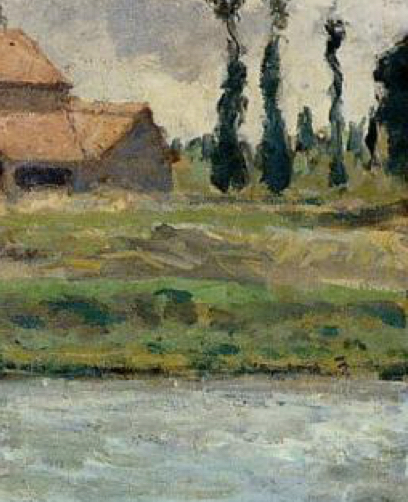 And the younger children? Do they have as much to congratulate themselves for from the equality of inheritance as is believed? No doubt in some rich but small families the initial shares are large. Yet each child wants to have a family, and the land, first divided into a small number, divides itself anew into a larger one, and sooner or later the splitting proceeds geometrically. For small landowners, this evil is felt in the first generation. Each nevertheless stays attached to his small bit of property, tormenting and exhausting himself in order to eke out a wretched existence that he would have earned with less pain and more profit in another profession. He dies young, or, not being able to support himself and his children from his own property, he ravages his neighbor’s. One must live in a land where all the people are property-holders in order to gain the correct idea of the inconveniences and misery of these infinite divisions of landed livings.
And the younger children? Do they have as much to congratulate themselves for from the equality of inheritance as is believed? No doubt in some rich but small families the initial shares are large. Yet each child wants to have a family, and the land, first divided into a small number, divides itself anew into a larger one, and sooner or later the splitting proceeds geometrically. For small landowners, this evil is felt in the first generation. Each nevertheless stays attached to his small bit of property, tormenting and exhausting himself in order to eke out a wretched existence that he would have earned with less pain and more profit in another profession. He dies young, or, not being able to support himself and his children from his own property, he ravages his neighbor’s. One must live in a land where all the people are property-holders in order to gain the correct idea of the inconveniences and misery of these infinite divisions of landed livings.
The equality of inheritance has had another effect, a political effect of great consequence. It has caused voluntary service to fall off and has forced the government to establish and generalize conscription, a deplorable necessity that weighs on everyone and most especially on the poor, who have neither wealth nor affection other than their children. The liberals see this forced service as the obligatory accompaniment to and support for liberty. Where domestic affections were strongest, landowning families, even the less well off, made enormous sacrifices to protect their children from recruitment, and by tenderness, some also by vanity, or in order not to appear poorer than their neighbors, more often than not they gave as a replacement for a younger son him who had the right of primogeniture, and this cause of ruin has increased still more the fracturing of properties in the agricultural provinces.
A youth who would be better clothed, better fed, and better lodged in our army than at home, dreads the military service that in the past he would have embraced with ardor and alacrity, and more and more of those who in the past set the example for the people by accepting its risks now develop a distaste for this noble profession. Since then, civil employments and dignities, by the renown and importance of their functions, have taken pride of place in France away from the profession of arms.
I do not think that, in a continental state, one can view indifferently a change of spirit and manners that comes from republican opinions. The military spirit is the seedbed of all the virtues that defend and preserve societies: the willingness to risk one’s life that comes of courage, disinterestedness, generosity, and resignation to sacrifice. It was in the lands of agricultural and warlike people, like the Vendée, the small cantons of Switzerland, and Spain, that the Revolution found the most resistance. Never has an industrial and commercial people defended its land. Farmers beat ploughshares into arms. Workers will make wool and fabric even for the enemy.
The equality of inheritance strikes a mortal blow to property. Why should the landowner acquire and improve a property, that gives him so much trouble during his life and that must at his death disappear into imperceptible fractions and increase the patrimony of another family? Why should he attempt risky improvements that he might not complete and that no one after him will continue? Who will loan the necessary funds, at the risk of seeing himself thrown among several heirs? The children will no longer say what their father had said: “These are the trees my father planted, the fields he cleared, the well he excavated.” No monument to the labors and intelligence of their father will remain. Those touching reminders that gave birth to and inspired the desire to leave similar ones for his children will be erased, and the children will no longer know where their cradle rocked, nor where their father’s ashes lie.
The right of primogeniture in domestic society has the same effects as heredity in political society. And if the monarchy of the father kept the Roman Republic from pitching over the precipice to which democracy had led it, and was, with religion, the anchor that held the ship before the storm, what force of stability and preservation would it not give to the monarchical state, when the domestic power and the public power, the power of morals and that of laws, each constituted like the other, lend each other mutual support?
I have not spoken of one of the most palpable political inconveniences of the equality of division: the progressive diminution of the number of electors and eligible members. The liberal party does not seem to be touched by this, no doubt because it wishes to replace landowning electors with patent-holding electors. All they desire today is motion: motion of persons, fortunes, and the mind. It is the agitation of a fever that raises the humors and expends strength. But everything should tend to rest, for the force that preserves us is rest.
No doubt, as one journal said, “the earth is no more monarchical than democratic.” Who doubts this? Yet who can doubt that men take habits, sentiments, and their cast of mind from their different ways of life or constitutions of social existence? Thus, in the monarchical family the authority of the father passes after his death to the eldest of his children, without the peace among the brothers being troubled, for they see the heir as the support of their name, the representative of their father, and the last resource of their old age. This unites itself naturally to the monarchical government of the state, and the stability, regularity, tranquility, hope of permanence and preservation of government fits well with the weighty, uniform, and laborious habits of the life of the fields. At the same time, but as its contrary, industrial and commercial families with their acquisitiveness and taste for hazardous enterprises, eager for innovation and prospering in revolutions, accommodate themselves much better to the turbulence and mobility of republican governments. All one need do is glance at Europe to see where monarchical sentiments and where republican opinions are found.
The identity of constitution between domestic society and public society, and the harmony of their principles, is thus the most powerful means of strength and true prosperity for both, and it is because one party in Europe is persuaded of this truth that it sets itself to dissolving the family in order to arrive more promptly at the disorganization of the state.
Moreover, the proposed law can be nothing but optional. It leaves the father total liberty to make an equal division among his children, or, what leads to the same thing, to do nothing at all. In the south of France, in the land of Roman law, where families were more landed and more monarchical, everything that brings back the old habits and customs will be received with satisfaction, and at the beginning of the Revolution, the people of the countryside never seemed to me more alarmed than when the Constituent Assembly announced the law of absolute equality of inheritance. Should the proposed law be received less eagerly in the north of France, there will be no need to be astonished. The north was ruled by other customs. The people there were less landed and busier with industrial work.
The mobile fortunes of commerce and industry divide themselves by equal shares among children. These families are not, strictly speaking, political families, for they lack landed property. Landowning families are planted in the soil. The others only rest upon the soil and are ready to abandon it if they find a more fruitful industry elsewhere. Thus, the agricultural family is fixed. The industrial family is mobile, but it tends to fix itself and to pass from the purely civil state to the political state. For this reason, it is in the interest of the state, as it is that of families, that landed property concentrate itself and that mobile property divide itself, in order to leave to a greater number the means to obey their natural tendency and plant themselves in the soil. The contrary obtains today. Immense fortunes are made with capital, and the great fortunes of the land are dissolving. We spin with steam-driven machines that have the force of fifty horses, and soon we will no longer work the fields with the spade and hoe.
I have spoken of the principle of the right of primogeniture, and I have not busied myself with the consequences that the government has deduced from it in its proposed law in the Chamber. We must not forget that this is a proposed law, and that the Chamber could modify and extend it. There are laws on which it is fitting to leave to the Chamber a sort of initiative, in presenting them only with a principle, leaving to their wisdom the care of developing from it and applying its consequences, and I see that this one on the division of families is one of those laws.
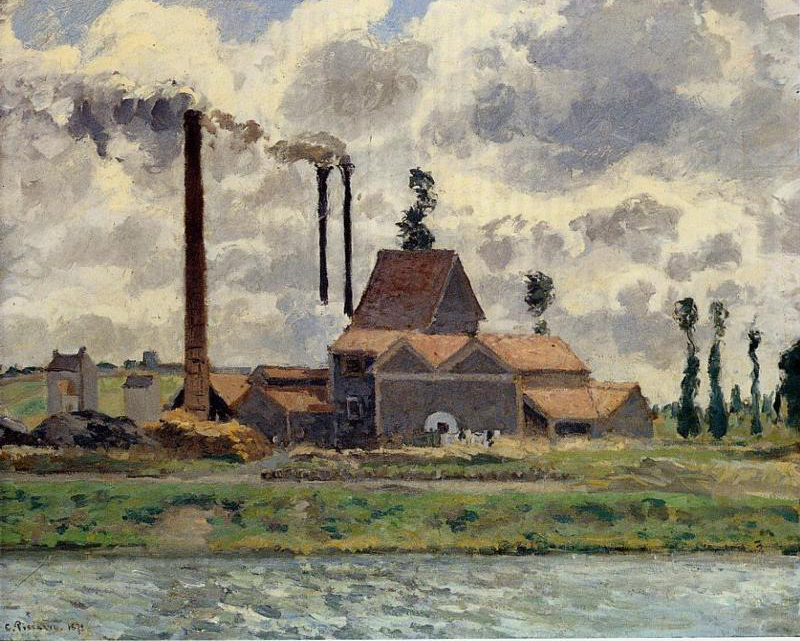
Louis de Bonald was born in 1754 to a noble Provencal family. He was a philosopher, politician, and counter-revolutionary who promoted theories of theocracy and traditionalism. He died in 1840.
This translation was originally published in Critics of the Enlightenment, 2nd edition, 2020, by Cluny Media of Providence, Rhode Island. The collection includes the above piece and five others, edited and translated by Christopher O. Blum. Dr. Blum is Academic Dean at The Augustine Institute. Hearth & Field is grateful to him for granting us permission to reprint this work.




